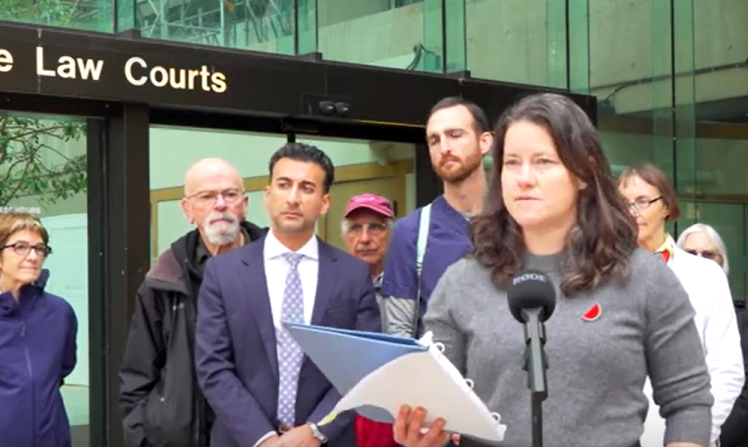A lawsuit filed in BC Supreme Court highlights the issue of how much employers can limit political speech by employees when those people are not at work.
Lawyers say senior managers, public-facing employees and public-sector employees are all likely to be representing their employer in their personal time, whereas the less senior, private sector, non-public-facing employees are less likely to have that scrutiny on their private activities.
Former director of inclusion, diversity, equity and accessibility at B.C.’s Northern Health Authority, Amy Blanding, is suing her former employer and seeking damages for constructive dismissal as well as aggravated damages for breach of duty of good faith and fair dealing.
Blandin claims in her that four people complained in a letter to her former employer and said that they were “demanding that Northern Health take action about Ms. Blanding.”
This followed Blanding performing a song that she wrote, which supported Palestinians, posting the song on Instagram and wearing a T-shirt with a watermelon logo outside work. The watermelon logo represents the struggle against Israeli occupation on land that Palestinians claim to be theirs.
The letter alleged that Blanding’s song was “Pro-Hamas/Pro-Palestinian and Anti-Israel/Anti-Semitic,” and that her clothing conveyed her “association” with the “Jihadist movement,” Blanding said in her notice of civil claim.
Blanding said in her lawsuit that she rejected those claims and she said that she is not anti-Semitic.
Northern Health demoted Blanding “prior to any investigation into the allegations,” she alleged.
Northern Health later gave Blanding a letter directing her to work with the communications team to develop a public statement about the work of her department. Northern Health then allegedly gave Blanding a pre-drafted statement and demanded that Blanding publish the statement on her social media.
“The statement implied that Ms. Blanding had acted contrary to her responsibility to provide an inclusive environment and required her to state that she would commit to that responsibility,” she said.
When she asked for time to consider whether to post the statement, Northern Health allegedly refused that request.
It then gave her a letter demoting her and placing her on administrative leave.
While Blanding was on that leave, Northern Health allegedly communicated with the letter writers and conveyed its agreement with them about the allegations, Blanding said in her lawsuit.
Those actions led to Blanding advising Northern Health that she was “unable to return” to work.
None of the allegations has been proven in court and no response to the notice of civil claim has yet been filed.
“Northern Health cannot comment as this is a human resources matter before the courts,” the health authority told BIV in an email.
Yeager Employment Law lawyer Julianne Yeager told BIV that the plaintiff in this case was a public-sector employee working in a public-facing capacity.
“She was at the director level for inclusion so you can see why Northern Health would be concerned that Jewish people, and perhaps lots of other sectors of the society, would feel some bias against them in the organization because of the activities that she carried out.”
Yeager said that if the employee is in a more senior role, and if the person is in a job that is public-facing and in the public sector, the employee is more likely to be seen to be representing their employer even when not at work.
That could give the employer more leeway to take disciplinary action if employee actions or commentary is controversial.
She said many wrongful dismissal cases involve alleged political behaviour outside work, and she has seen some cases decided in favour of the defendant while others were decided in favour of the plaintiff.
Employees who have posted thoughts on social media that reflect badly on employers have also been dismissed and had cases heard in court, she said.
She advises employers to have written policies governing what social media commentary is allowed, and what is not.
Private-sector employers sometimes take action against employees when the employee flaunts the employer’s name while participating or helping others participate in political acts.
In February 2022, when one of the anti-COVID-19-restriction trucker convoys was headed to downtown Vancouver, one of the vehicles was a van wrapped with Orca Realty branding.
Orca Realty owner Michael Welsh immediately posted a message in red text on his company’s website.
“Orca Realty DID NOT participate in this convoy protest today. Orca Realty would NEVER be part of this EVER,” the message read.
The Monday after the weekend event, .
“I would think that was defensible because in that particular situation they drove a highly recognizable, employer-branded vehicle,” Yeager said.
“The case would be stronger if the company had explicit policies on the use of company vehicles.”



